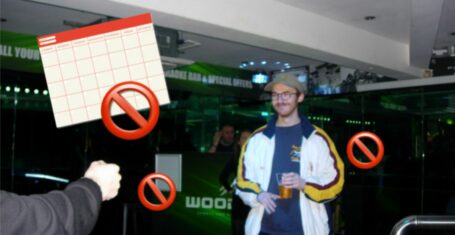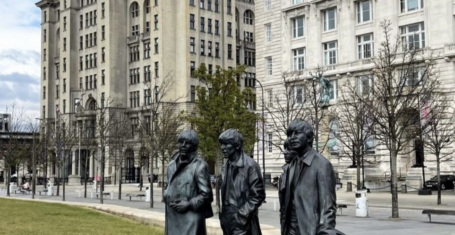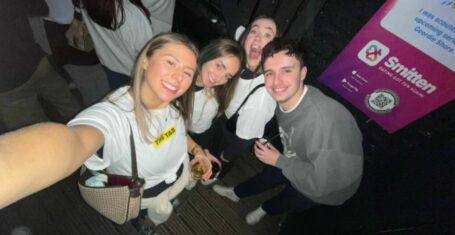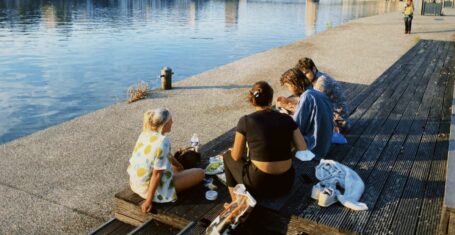
‘I can still smell the dead people’: My horror in Gaza
Meet the Law undergrad whose life as a student in Liverpool is very different to his home in war-torn Gaza
Basel Sourani can still smell dead people.
You might dip into the news every now and again and hear about terrors in Gaza, then carry on your day without giving it a second thought.
Not Basel, who lived in the war-torn country until he came to University.
The second year Law student can still smell dead people as he lounges on the plush red leather in Leaf- a suburbia worlds apart from the misery of his hometown Shijaiyah, Gaza.
“I went there again this summer and I came back and I can smell nothing but this smell,” he said.
“The smell of dead people, the smell of dead children.
“I can’t smell anything else. I came home, I took a shower, I put on all the perfume in the house and the smell still won’t go, it’s still not going,” lowering his hands now as if accepting defeat.
“Since the war everything you dream about is nightmares. The life of a Gazan is basically a nightmare which we cannot wake up from.”
Basel at his hometown in Gaza
Basel looks a lot like you. The second year is barely noticeable among the others lazily typing on their laptops or laughing about last night with friends. His demeanour is relaxed and jovial with little trace of the trauma he experienced in Gaza.
But he has seen horrors which no amount of TV news or shocking Twitter pictures can ever truly capture. Basel is only 20, has lived through three wars and seen more dead bodies than you ever will. Then again, as he explains, he wanted to see it.
“There was a ceasefire that was for two or three hours, and my father was always going outside. I told him I wanted to see the images. I wanted to tell my friends.
“All I could see was destroyed houses, jeeps, and the smell of dead people – nothing else to think about. I don’t even know if this place will be suitable for life after.”
A common image on the roads in Gaza
Basel’s accent began to seep through his speech as he struggled to find the words to describe the scene. Recounting dozens of people buried under rubble decomposing for days, with civilians walking over them, unable to clear the bodies due to the sheer mass.
“I saw the bulldozers taking away the bodies because we lacked the equipment to find the bodies easily. I saw lots of destroyed ambulances, all with bodies in.”
Bulldozers are used to transport dead bodies from the area
He even visited the Shifa hospital, a place “full of screams, sadness and tears.”
“What you see is people who have lost their hand, people who have lost their leg and people who will stay for a couple of days then will get released and die.”
In the end, he had to get out. Basel’s family sacrificed a great deal to get him to Liverpool, escaping from the Palestinian city in order to get a superior education.
Paying thousands just to reach Egypt, he is often worried he won’t be able to go home, as the border controls may be tightened. This summer he only managed to enter due to a ceasefire of two days.
“I have Egyptian residency which helped a lot – any foreign passport helps. But if you’re a Palestinian, you have nothing like this so you stay inside and you get killed.”
Shijaiyah is one of the oldest districts in Gazan history and the area is densely populated with a poor quality of life. The neighbourhood witnessed one of the heaviest bombardments in Israel’s 13-day offensive in July, where around 100 Palestinians were killed.
With half a million people in Gaza without a home, whole areas completely ruined, Basel is concerned about the winter, and the lack of material to rebuild homes for people. His expression, which before now had been relatively calm, turned angry as he hammered in the point.
“Now they aren’t thinking of Gaza and of the post war problems, they’re thinking of ISIS and all that bullshit, and they have left all these people.”
The landscape in Shijaiyah, with numerous homes obliterated
This student’s day to day life in Gaza couldn’t be more different to his one in Liverpool. I found it hard to imagine him amongst the injured, the rubble and the upset as even when he spoke of Gaza, he chatted as if he was telling me about what had happened on campus.
“I was sitting in my house with my mother and my father, everyone was sitting like us,” Basel gestured to the laid back décor of the Bold Street haunt.
“Instead we were just waiting for the bombs to drop, you just kept hearing the drones, 16s, helicopters just above you – you don’t even have anything to distract you from the sound.
“There is no electricity, nothing you can do. You can see none of your relatives, none of your friends and you are scared that at any time you must lose them.”
Basel and his father Raji Sourani, a human rights lawyer.
And if it’s hard to picture Basel’s world back home, it’s equally difficult for him to adjust to an easier life in Liverpool. He admits he is still haunted by his experiences in Gaza:
”Yesterday I was walking with my friends near the dock and we heard this plane and for a second I touched my friends hand, and I remembered the sounds of the F16s when it was hitting and I was just waiting for the rocket to land. For that moment, I am back in Gaza.”
Basel is part of University of Liverpool society, Friends of Palestine which gives him hope and support. The society aims to raise awareness and does this by hosting rallies and events throughout term such as screening topical films.
“All the resources and all their hard work makes me believe there are people who can stand with us who have humanity in their hearts” said Basel, greeting Karim, Chairman of the society who had joined us.
Karim and Basel, the exceptional sandwich and hot beverages
“As students it’s very hard to get involved in something that doesn’t directly affect you” explained Karim, who plans on visiting Gaza soon.
“It’s hard to care about something so far away, away from everyday life and reality, so we bring home the message.”
Apart from misery, students must be mobilised to create change. Basel is certain the only way resolution can be achieved is through western intervention, primarily stopping exports to Israel.
“Israel has committed this because the western countries gave them political and legal cover and international support and means to kill Palestinians. The west, including the US gave them the license to kill people.
“Palestinians do not have demands, they are basic human rights.
“It’s not about the ceasefire lasting- the ceasefire is not the solution. Leaders have to know this war, this offensive – they will carry on doing another one and another one.”
In the meantime, Basel is getting a Law degree so he can fight for his country using legal means, although he does sympathise with those picking up arms. You might see him, if you have lectures near the law department, with his calm and jovial manner. If you do, remember – behind that exterior is a man who sees and smells death.
“The solution is just to end this siege … no one can live being isolated from the whole world.”









































